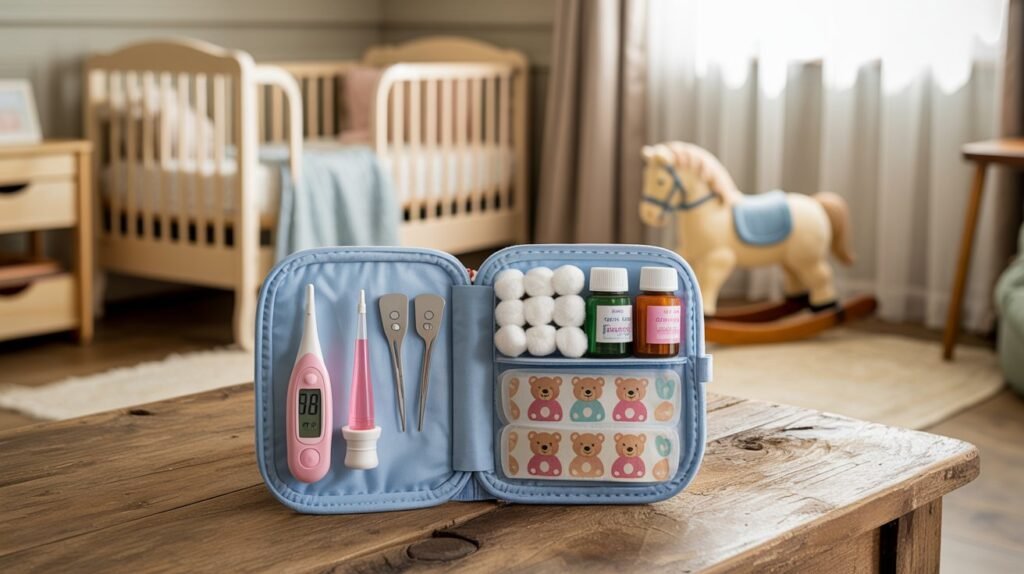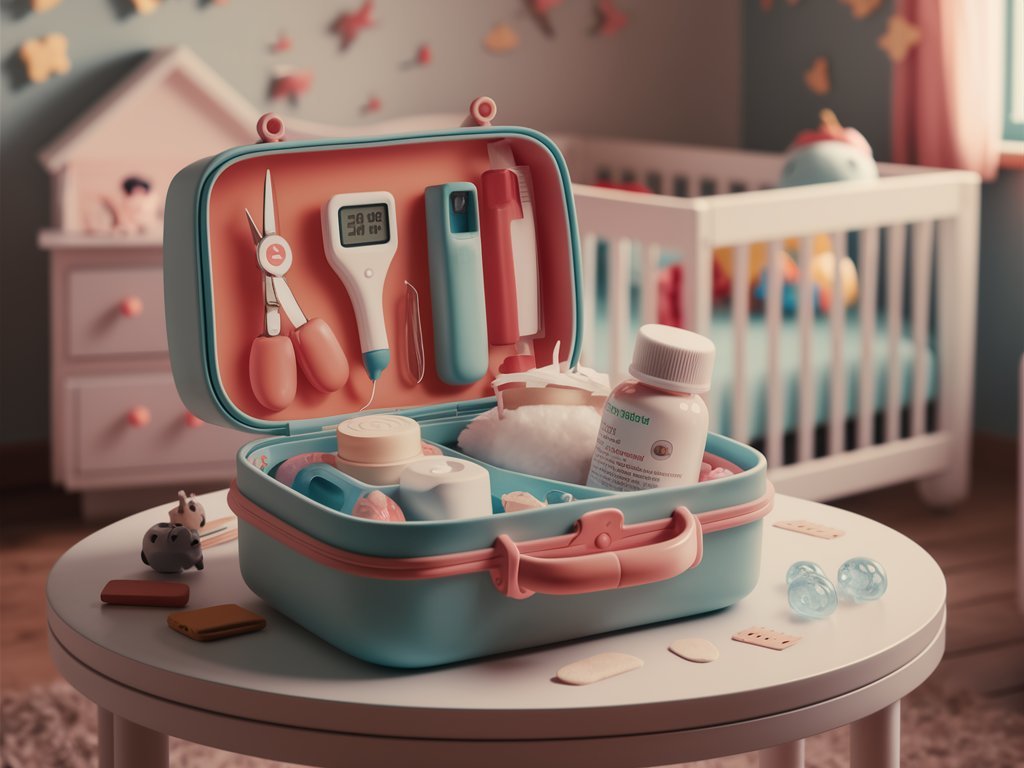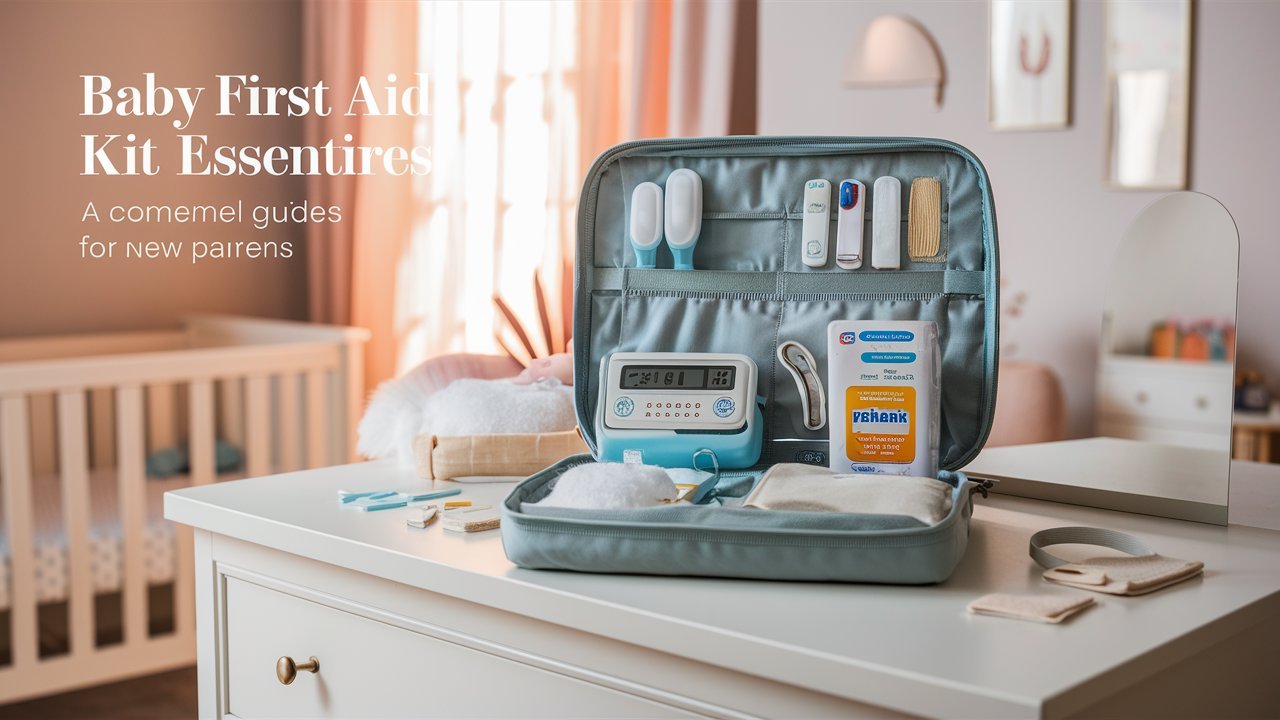Introduction As a new parent your babys safety is your top priority Having a well stocked first aid kit ensures youre prepared to handle minor injuries and health concerns quickly This guide provides a complete checklist of essential items to include in your babys first aid kit along with tips on how to use them when to update the kit and how to keep it organized
Why Every Parent Needs a Baby First Aid Kit ?
Accidents can happen anytime and being prepared is important A baby specific first aid kit contains items tailored to your infants needs which are different from adult kits It helps you respond quickly to small issues reducing stress and keeping your baby comfortable Whether its a fever a scraped knee or nasal congestion having the right supplies ready gives peace of mind
Essential Items to Include in Your Babys First Aid Kit
1 Thermometer A digital rectal thermometer gives accurate readings which is important for detecting fevers in infants Ear and forehead thermometers are easier to use but may not be as accurate for babies under six months
2 Nasal Aspirator and Saline Drops These help clear your babys nose and make breathing easier when they have a cold Saline drops loosen mucus and the aspirator removes it gently
3 Medicine Dropper or Syringe These make it easier to give your baby the right amount of medicine Look for one with clear markings and an easy to hold shape
4 Infant Acetaminophen or Ibuprofen These help with fever and pain relief Always check with your pediatrician before giving any medication Dosage depends on your babys weight
5 Adhesive Bandages and Sterile Gauze Use these to cover small cuts and scrapes Choose baby friendly options that are soft and gentle on the skin

6 Antiseptic Wipes and Creams Use these to clean small wounds and prevent infection Alcohol free wipes are safer for babies
7 Tweezers and Scissors Tweezers are helpful for removing splinters or debris Scissors are needed to cut bandages or clothes Use scissors with rounded tips to avoid accidents
8 Emergency Contact Information Keep a card with numbers like your pediatrician poison control and local emergency services Also note any allergies or medical conditions
9 Baby Nail Clippers and File Babies often scratch themselves Keep their nails trimmed with safe baby sized clippers
10 Cotton Balls and Swabs These are useful for cleaning around your babys eyes or applying cream Dont insert swabs into the ear canal
Optional Additions for Extra Care
- Teething gel or rings for sore gums
- A small digital scale to track weight during illness
- An emergency blanket to keep your baby warm
- Oral rehydration packets for mild dehydration
- Forehead thermometer strips for quick checks
- A small flashlight or headlamp for emergencies in the dark
Tips for Keeping Your Babys First Aid Kit Ready
- Check Expiration Dates Look over medications and ointments every few months
- Refill Used Items Restock anything youve used right away
- Customize It Add items your pediatrician recommends
- Stay Organized Use a labeled waterproof container with compartments
- Keep It Handy Store it in a cool dry spot thats out of reach of kids
Travel and On the Go Kits Make a smaller version for your diaper bag or car Pack basics like bandages wipes a thermometer and infant medication Its helpful when youre out and about
Basic First Aid Skills Every Parent Should Know
Having the right tools is great but knowing how to use them is just as important Consider taking an infant CPR and first aid course These classes teach how to help in emergencies like choking or injury Many hospitals and community centers offer them
Conclusion A good first aid kit is a must have for every parent Keeping it stocked and ready means you can handle small health issues with confidence Customize it to your familys needs and check it regularly Being prepared makes all the difference when your baby needs care

Click Hear for more tools :
How often should I check the kit?
Look through it every 3 to 6 months and after each time you use it Update it as your child grows.
Can I give my baby adult medicine?
No Always use medicine made for babies and ask your pediatrician first The wrong dose or ingredients can be dangerous
Where should I keep the kit?
Store it in a place thats easy for you to reach but out of your childs reach A high shelf in the bathroom or nursery works well
Can I use one kit for more than one child?
Yes just make sure you have enough supplies for everyone and include allergy notes for each child

